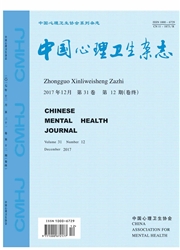

 中文摘要:
中文摘要:
目的:了解中国30-79岁成人抑郁障碍与冠心病及脑卒中之间的关联。方法:中国慢性病前瞻性研究于2004年至2008年在全国10个项目地区开展基线调查,收集了512 891名调查对象的人口社会学特征、行为生活方式、常见慢性疾病史及其家族史,以及通过WHO简版复合性国际诊断访谈表(composite international diagnostic interview-short form,CIDI-SF)诊断12个月内抑郁发作(major depressive episodes,MDE)情况。体格检查获得的身高和体重用来计算调查对象的体质指数,采用χ2检验和t检验比较不同MDE状态之间的基本特征,通过非条件Logistic回归模型计算不同抑郁状态与冠心病、脑卒中之间的比值比(OR)及其95%可信区间(95%CI)。结果:共有3 281人(0.6%)在12个月内抑郁发作,15 472人(3.0%)自报患有冠心病,8 884人(1.7%)自报患有脑卒中。抑郁障碍与冠心病和脑卒中患病风险升高有关,年龄和性别调整后的OR值及其95%CI分别为1.80(1.53-2.12)和2.53(2.09-3.05),进一步调整其他潜在混杂因素后,抑郁障碍与冠心病和脑卒中的OR值分别为1.83(1.54-2.18)和2.19(1.79-2.69),此外,性别和抑郁障碍与脑卒中患病风险的关联存在交互作用(P=0.013),在两者联合分析中发现,男性MDE患者的脑卒中患病风险最高(OR=5.02,95%CI=3.70-6.82)。结论:中国成人抑郁障碍与冠心病和脑卒中患病风险升高可能有关,但需要在前瞻性研究中进一步证实。
 英文摘要:
英文摘要:
Objective: To investigate the associations of major depressive disorder with coronary heart disease( CHD) and stroke in Chinese adults aged 30- 79 years. Methods: In 2004- 2008,China Kadoorie Biobank was conducted in 10 geographically defined regions( 5 urban and 5 rural) of China. A total number of 512 891 participants aged 30- 79 years were recruited in the baseline survey. A laptopbased electronic questionnaire was administrated face-to-face by trained health workers,collecting the general demographic and socio-economic status,dietary and other lifestyle behaviours( e. g. smoking,alcohol drinking,physical activity),medical history and family history of common chronic diseases. Major depressive episodes( MDE) in the past 12 months were assessed with the World Health Organization composite international diagnostic interview-short form( CIDI-SF). The physical measurements included the heights and weights,which were used to calculate the body mass indexes( BMI). Chi squared and t test were used to compare the differences in participants characteristics according to their major depressive disorder. Logistic models were employed to estimate the odds ratios( OR) and 95% CI of their major depressive disorder with prevalent coronary heart disease and stroke. Results: Among the 512 891 participants,3 281( 0. 6%) showed an MDE in the preceding 12 months,15 472( 3. 0%) reported prevalent CHD,and 8 884( 1. 7%) reported prevalent stroke. Major depressive disorder was significantly associated with an increased risk of CHD and risk of stroke. Age-and gender-adjusted ORs( 95% CI) were 1.80( 1. 53- 2. 12) for CHD and 2. 53( 2. 09- 3. 05) for stroke. The associations were significant after further adjustment for potential confounders,such as other socio-demographic status,smoking,alcohol drinking,physical activity,and BMI,prevalent hypertension,diabetes as well as family history of cardiovascular diseases( OR = 1. 83,95% CI = 1. 54- 2. 18 for CHD; OR = 2. 19,95% CI = 1.
 同期刊论文项目
同期刊论文项目
 同项目期刊论文
同项目期刊论文
 期刊信息
期刊信息
